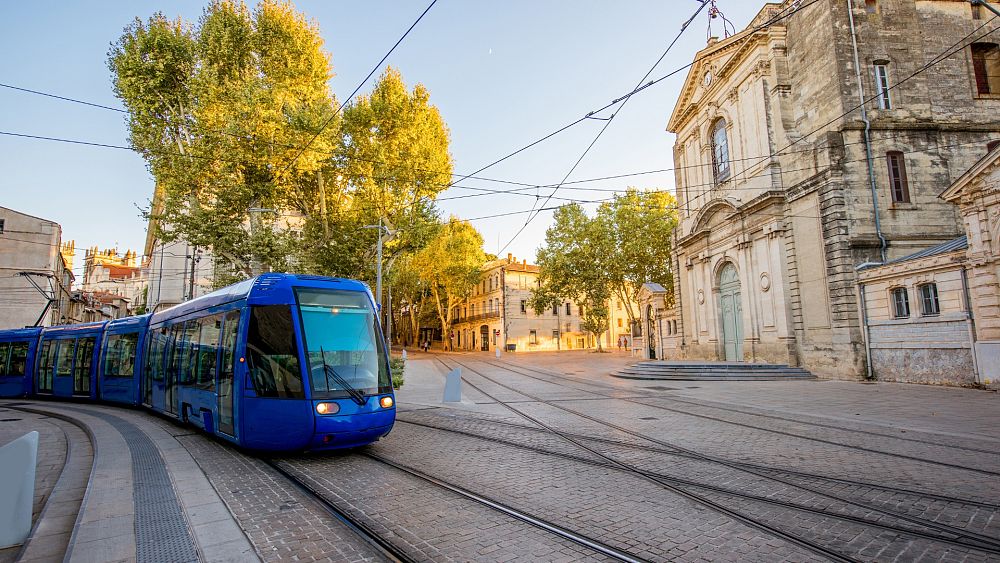Montpellier in southern France is set to introduce free public transport.
It will become the largest French metropolis to introduce such a scheme.
From the end of this year, local residents will be able to utilise a free transport pass across the city’s bus and tram network. The scheme aims to slash emissions, reduce pollution and improve accessibility for the city’s residents.
“By introducing free transport, we are bold in taking a great measure of social justice, of progress, which works for the ecological transition,” tweeted the mayor of Montpellier, Michaël Delafosse.
Montpellier has been experimenting with free transport on weekends since September 2020. In 2021, it extended this to weekdays for under-18s and over-65s.
The further extension of the scheme is part of the city’s €150 million push for zero carbon mobility, which also includes investment in cycle lanes and the creation of a low emissions zone.
Where else has free transport in France?
Montpellier is far from being a trailblazer. In fact, French towns and cities have been rolling out such schemes since the country’s transport management was decentralised in 2015.
However the majority of these have less than 150,000 inhabitants.
With almost 200,000 inhabitants, Dunkirk is the largest city to have embraced free transport so far. After it introduced fare-free bus routes in 2018, passenger numbers increased by an average of 85 per cent.
The scheme is funded by a small increase in the Mobility Payment tax already levied on public and private companies in France with more than 10 employees.
In total, 39 territories in France have similar schemes, including the Marseille suburb of Aubagne, the port city of Calais and the western commune of Niort.
Montpellier will be the largest city so far to adopt such a scheme.
What are the pros and cons of free transport?
Proponents say free transport schemes reduce car use (and therefore pollution and emissions), draw people to city centres, increase purchasing power and democratise access to transport.
However, some fear it could discourage investment and development in the transport sector, and that the costs could fall on taxpayers.
Increased demand spurred by ticket-free travel may also stretch capacity in busy urban areas, while similar schemes across Europe have not always proven to reduce car use.
Could free transport come to Paris?
The concept might not be so easily replicated in France’s biggest city, Paris, which relies more heavily on transport ticketing revenue.
For some medium-sized municipalities, ticketing represents as little as 10 per cent of transport funding, according to Vie-publique. In large urban areas like Paris, Lyon and Marseille, it ranges from 25 to 40 per cent.
These cities are more likely to continue opting for partial free access to transport that focuses on lower income groups, such as young people, seniors and unemployed people.
For example, in the French capital free transport for under-18s was introduced in 2020 to help students return to school. Nantes introduced free weekend travel in 2021. And in 2021, the Occitane region in southern France trialled offering 30 free train journeys per month to 18 to 26 year olds.
How can you get a free Montpellier transport pass?
Montpellier residents can sign up for a free transport pass on the M’Ticket app. Photo ID and proof of address are required.
The pass will then be available on your smartphone and must be validated each time you board the bus and tram.
Which other European countries offer free transport?
Two European countries stand out for their trailblazing free transport schemes.
Estonia’s capital Tallinn introduced free public transport in 2013. In 2020, Luxembourg became the first country in the world to scrap fares on all public transport.
Spain is experimenting with free train tickets for short and medium-distance journeys in a scheme that runs until the end of this year. It aims to reduce the impact of the cost of living crisis, while cutting CO2 emissions.
Germany introduced a similar measure between June and August last year with a discounted nationwide public transport pass. It gave travellers unlimited use of local and regional services for just €9 a month.
Together, France and Germany are giving away 60,000 free train tickets to young people this summer to encourage cultural exchange.
More than 50 cities and towns in Europe have now introduced free public transport, citing climate ambitions and social equality as their primary motivators.


